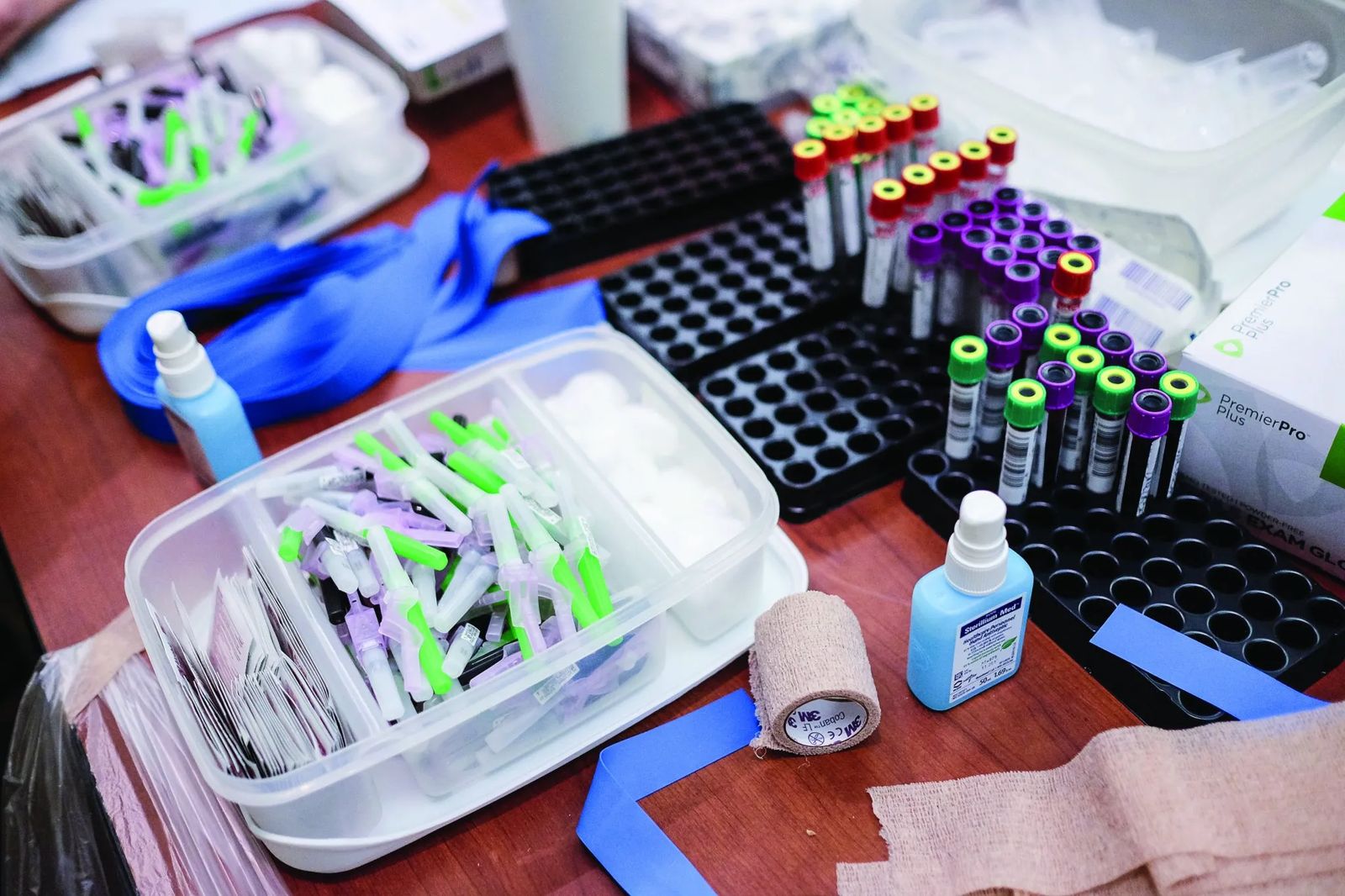
Decoding the Numbers
What does your blood test say about you?
If you’re like many of us, you’ve probably gotten poked and prodded at some point in your recent past only to get a laundry list of positive and negative numbers and unrecognizable acronyms and abbreviations handed to you a week later. It all appears to be perplexing bits of medical jargon. What the heck is Albumin? Or, is it a good thing when your Basophils are less than 1%? Are there some numbers that you and your doctor should be dissecting just a little bit more?
“Does it really matter that I am .2 off on this one little thing?” asks Dr. Jennell Duey, a family physician with Billings Clinic, as she looks at one of her patient’s recent blood work. She knows the questions patients have. While the results from your blood work can be like trying to read a foreign language, the test does give your doctor an interesting look at your health. “It is a piece of the puzzle when you are looking at the big health picture.” And that’s why Dr. Duey says it’s a good idea to get your blood work done each year paired with an annual exam.

Breaking it all down, your blood is what delivers oxygen through your body and helps to rid it of waste. Major organs rely on this delivery system to perform at their best. So, when you look through the long list of factors that a blood test takes into account, your doctor is simply trying to make sure that your organs are working together just as they should.
Truth be told, before many of us start to see the signs of a health issue, there are red flags that might pop up on a routine blood test. “A perfect example might be looking at the BUN and Creatinine numbers, which are markers of kidney function. A lot of people feel perfectly fine but maybe they have had years of underlying high blood pressure and over time that has caused damage to the kidneys.” Dr. Duey adds, “A lot of these things, by the time you actually feel bad, have been problems that have been years in the making. If we catch them early, we can take care of you a whole lot better.”

While some signs are benign, others might truly be your body trying to send off a warning signal. Anemia is a perfect example of such a warning sign in women. “Is your hemoglobin or hematocrit low because of iron deficiency, from blood loss due to heavy or prolonged menstrual periods or maybe even something more insidious like colon or blood cancers?” One of Dr. Duey’s patients had been putting off a colonoscopy, but when a review of her annual blood work showed anemia, Dr. Duey immediately called for a colonoscopy to rule out something more serious. Dr. Duey says, “She was shocked that anemia might be a symptom of something like colon cancer.”
While the numbers do share a bit of a story, Dr. Duey stresses, “You have to see a person’s labs with their family history, risk factors and their numbers in mind. It’s much more than a number.” Take a person’s cholesterol for instance. Dr. Duey says, “Some people might have a cholesterol of 300. They are obese and they are making horrible dietary choices. They don’t exercise. So, with those people we really can take preventative measures, and offer some lifestyle counseling to make an impact.” On the other hand, there might be a person who does all the right things but still gets unsavory numbers thanks to their genes. “As we talk about your family history at your annual exam, you might say ‘Yeah gosh, Dad died of a heart attack at 48 years of age.’ Then I would know that, yes, we need to address your cholesterol using a different strategy.”
Today, many employers offer blood tests as a part of an annual health screening, Dr. Duey says make sure you don’t end there. “Ideally, what I would like to see employers do is have workers get their points for their blood test in conjunction with a health maintenance exam.” Dr. Duey says she’s seen some take their results and then hit the web searching for information on what their irregular number might mean. “I never have a problem if a patient is concerned to send a message to me to ask, ‘Hey my TSH is 6, is this something I need to make an appointment about now? Is this something I need to be concerned about?” She would much rather see that than have someone in a state of panic because an Internet search delivered some concerning and in some cases, completely unreliable information. Dr. Duey laughs as she says, “The Internet can be incredibly helpful but it can also cause undue panic.” Instead, Dr. Duey says, it’s important to go over the numbers with a trusted professional, “And ask, what things can I change?”

Bottom line, Dr. Duey says she does not subscribe to the message that no news is good news. The more you can be informed about your health, the more chances you have to make your health the best it can be. “Some people may avoid these tests and avoid coming to the doctor altogether because if they don’t come in, they don’t have to face the fact that there might be an issue.” She knows that an ounce of prevention is worth a pound of cure. A simple blood draw just might be the key to help draw attention to underlying issues that you can change for the better over time. Dr. Duey says, “Sometimes it says something as to what you are doing at home and it opens the door to ask questions. It opens the door to make some changes too.”
THE BLOOD TEST BREAK DOWN
Key facts that your doctor wants to know about your health
When you get your blood work done, chances are you’ll get a complete blood count (CBC), a comprehensive metabolic panel and a lipid panel. What do these tests reveal? Here’s the answer in a nutshell.
GLUCOSE: Glucose is essential for life but, when it’s out of balance, it can lead to kidney and heart disease or Type 2 Diabetes. The good news, Dr. Duey says is, “The most common cause of diabetes among adults is Type 2 Diabetes, which is related to weight and inactivity. If we can get some people on a good exercise and dietary modification program, we can lower their blood sugars and insulin levels.” When it comes to results, 70 to 110 mg/dL is standard.
CREATININE WITH GFR: This little nugget of information keys in on kidney function and how well this organ is filtering the waste in your body. The standard range here is 0.7 to 1.2 mg/dL. Dr. Duey says it’s important to note that low numbers typically don’t alarm doctors, it is the high values that they tend to want to evaluate further.
ALKALINE PHOSPHATASE, AST and ALT: This little part of the test looks at your liver function, which is key in metabolic processes. Blood work can measure if your liver, one of the hardest working organs, is getting the job done. Dr. Duey says, “Another thing we see in high liver function test is related to alcohol. There’s a certain pattern with the AST being higher than the ALT that we see when people are drinking too much alcohol.” If that’s the case, talk to your doctor about lifestyle changes that might put your liver function back in check. Normal values are 50-136 U/L for Alkaline Phosphatase, 10-55 U/L for ALT and 5-40 U/L for AST.
CHOLESTEROL: Cholesterol is a fatty substance that can wreak havoc on your arteries and actually be the trigger point for heart disease or stroke. HDL is the so called “good” cholesterol and it’s a figure that can never be too high. LDL is the so called “bad” cholesterol. Doctors tend to focus on the cholesterol/HDL radio. Dr. Duey says, “Cholesterol certainly is always a big one for people to pay attention to, including the ratio of your good cholesterol to your total cholesterol.” The lower the number of that ratio, the lower your risk for heart disease. A three or below is your goal. Overall, a cholesterol number less than 200 and a LDL number less than 100 are desirable.
IRON: This little mineral shuttles oxygen all over the body which can impact mood, energy, metabolism and more. If your serum iron level is below 70 ug/dL, chat with your doctor about what you can do to improve this number. You might need additional blood tests to make sure that you’re not experiencing blood loss as well. Keep in mind however, when it comes to iron, too much can be toxic to your body.
COMPLETE BLOOD COUNT (CBC)
This panel gives doctors a glimpse at your overall health. Low red blood cell count (RBC) could indicate anemia. High white blood cell count (WBC) could mean you are fighting a bit of an infection or suffering from a bad case of stress. Low platelet levels might show that your blood isn’t clotting properly. Though more rare, blood cancers do also exist and can show up in this panel.
THYROID STIMULATING HORMONE (TSH)
When it comes to women, the TSH is a value that is common to be off kilter. Dr. Duey says, “Thyroid disease can cause fatigue, depression, hair loss, so many things that women experience.” The good news, Dr. Duey says is, “It’s such an easy problem to fix that I really do key in on that, especially for women.” A normal TSH will fall in the range of .49-4.67 iU/mL.
VITAMIN D
Living in the Big Sky State might have its drawbacks when it comes to getting enough Vitamin D, especially during the winter months. Dr. Duey stresses, “In the winter, from mid-October through March, we cannot get the proper UV rays necessary to make vitamin D in the skin. Those rays just don’t pass through the atmosphere at this latitude. Almost all Montanans do have a deficiency. It can contribute to depression, bone pain, and muscle aches with significant vitamin D deficiencies.” It can, over time, lead to osteoporosis since Vitamin D is key in calcium absorption. The good news is, if your blood test reveals that your levels are low, Dr. Duey says oftentimes a supplement will get you back on track.












